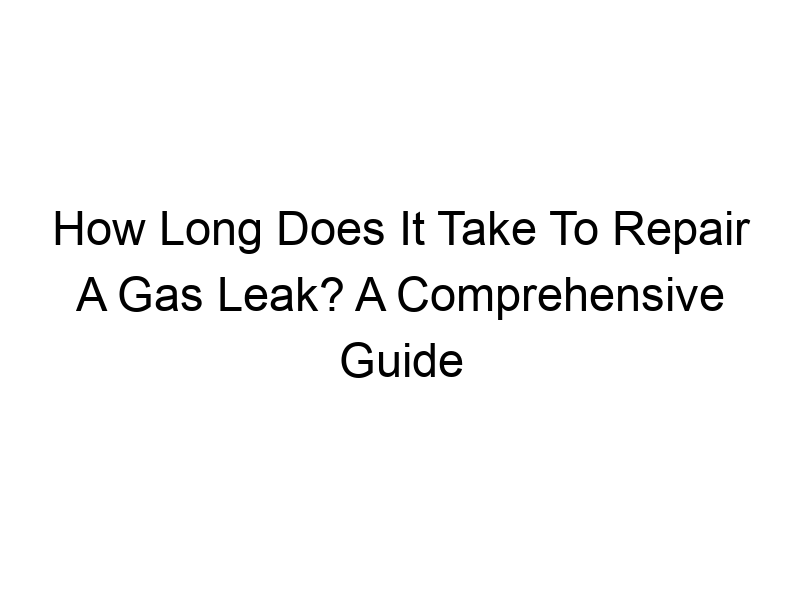A gas leak is a serious issue that demands immediate attention. The time it takes to fix a gas leak can vary greatly depending on several factors, from the leak’s location and severity to the accessibility of the affected area and the expertise of the repair personnel. This comprehensive guide will explore everything you need to know about gas leak repair timelines, safety precautions, and the overall process. We’ll delve into the various types of leaks, the diagnostic procedures, and the different repair methods employed by professionals. You’ll learn how to identify a leak, what to do in an emergency, and how to prevent future occurrences. By the end, you’ll have a clear understanding of how long does it take to fix a gas leak, and what you can expect during the repair process.
Understanding Gas Leaks:
Types and Causes
Different Types of Gas Leaks
Gas leaks can manifest in various ways, each presenting different challenges for detection and repair. These include hissing sounds emanating from pipes, the smell of gas (often described as rotten eggs due to added odorants), dead plants around gas lines, and bubbling water near pipes. The type of leak (e.g., a pinhole leak versus a major pipe rupture) significantly impacts repair time.
Common Causes of Gas Leaks
Gas leaks are often caused by corrosion, aging infrastructure, accidental damage (such as during digging or construction), improper installation, or even natural disasters like earthquakes. Identifying the root cause is crucial for effective and long-lasting repairs.
The Gas Leak Detection Process: A Step-by-Step Guide
Visual Inspection
A visual inspection is the first step. Look for signs of damage to gas pipes, fittings, and appliances. Check for rust, cracks, or any other visible signs of deterioration. Pay close attention to areas where pipes connect to appliances.
Using a Leak Detector
Professional gas technicians employ specialized leak detectors that can identify even the smallest gas leaks. These devices can detect gas concentrations far below the levels detectable by the human nose. Some leak detectors use electronic sensors while others utilize soapy water to detect escaping gas.
Emergency Procedures: What to Do When You Suspect a Gas Leak
Immediate Actions
If you suspect a gas leak, leave the premises immediately. Do not turn on any electrical switches or appliances. Do not light matches or use any open flames. Call your gas company’s emergency hotline immediately.
Evacuating Safely
Once outside, stay a safe distance from your home and inform your neighbors. Alert emergency services if the leak poses an immediate threat.
The Gas Leak Repair Process: From Diagnosis to Completion
Assessing the Damage
After the gas supply has been shut off, a qualified technician will assess the extent of the damage. This may involve further testing to pinpoint the exact location and cause of the leak.
Repair Methods
Repair methods vary depending on the type and location of the leak. Small leaks may be repaired by tightening fittings or applying sealant. Larger leaks may require pipe replacement or more extensive repairs. The complexity of the repair dictates the duration.
Factors Influencing Repair Time: A Detailed Breakdown
Location of the Leak
A leak in an easily accessible area will take less time to repair than a leak in a hard-to-reach location such as underground pipes or within a wall. Access to the leak is a primary determinant of repair time.
Severity of the Leak
A small, minor leak might require only a quick repair, while a significant leak may require extensive repairs and even pipe replacement, significantly extending the time required.
The Role of the Gas Company in Leak Repair
Emergency Response Time
Most gas companies have rapid emergency response teams that prioritize addressing gas leaks. However, response times might vary depending on the company’s resources, the number of simultaneous calls, and the location of the leak.
Repair Process and Timeline
The gas company will typically handle the repair process, dispatching qualified technicians to assess and fix the leak. The timeline depends on the severity of the leak, available resources, and the complexity of the repair.
Cost of Gas Leak Repair: What to Expect
Factors Affecting Costs
Repair costs vary considerably based on the location of the leak, the severity of the damage, the materials needed, and the labor involved. Simple repairs may be inexpensive, while extensive work could be substantial.
Insurance Coverage
Many homeowners’ insurance policies cover gas leak repairs, particularly if the damage resulted from a covered peril. However, policies vary, so it’s important to review your policy’s specifics regarding gas leak coverage.
Preventing Gas Leaks: Proactive Measures
Regular Inspections
Regular visual inspections of gas lines and appliances can help identify potential problems before they escalate into leaks. Look for corrosion, cracks, and unusual sounds.
Professional Maintenance
Scheduling professional maintenance checks for gas appliances can prevent many leaks. Qualified technicians can detect minor issues that might otherwise go unnoticed.
Choosing a Reputable Gas Repair Contractor
Licensing and Certification
Ensure that any contractor you hire is properly licensed and certified to work with gas lines. This ensures compliance with safety regulations and professional standards.
Reviews and Recommendations
Check online reviews and ask for recommendations from friends and family. This can help you identify contractors with a strong track record of quality and reliability.
Understanding Your Rights as a Consumer During Gas Leak Repair
Communication and Transparency
It is crucial for the gas company or contractor to communicate clearly and transparently throughout the repair process, keeping you informed of the steps and timeline.
Dispute Resolution
If you have a dispute regarding the cost or quality of repair services, know your options for dispute resolution. This might include filing a complaint with regulatory agencies or seeking legal counsel.
The Importance of Safety During Gas Leak Repair
Working with Professionals
Never attempt to repair a gas leak yourself unless you are a qualified gas technician. Gas leaks pose serious safety risks and require professional handling.
Following Safety Regulations
Gas repair professionals must adhere to strict safety regulations, using appropriate safety equipment and following established procedures to minimize risks.
Advanced Gas Leak Detection Techniques
Electronic Leak Detection
Electronic leak detectors are highly sensitive instruments that utilize various sensors to detect even the smallest amounts of escaping gas. This technology is essential for precise leak location and efficient repairs.
Acoustic Leak Detection
Acoustic leak detection uses specialized microphones to detect the high-frequency sounds produced by gas escaping under pressure. This method is often effective in locating leaks in underground pipelines.
Frequently Asked Questions
What are the signs of a gas leak?
Signs of a gas leak include a strong rotten egg smell (due to added odorants), hissing sounds near gas lines, dead or wilting plants near pipes, and bubbling water near gas pipes. If you detect any of these, evacuate immediately and call your gas company.
How long does it take for a gas company to respond to an emergency call?
Response times vary depending on location, the severity of the reported leak, and the gas company’s resources. However, gas companies prioritize emergency calls and aim to respond swiftly, often within minutes to an hour or so depending on the situation.
How much does gas leak repair typically cost?
The cost varies widely based on several factors, including the complexity of the repair, the accessibility of the leak, the required materials, and labor costs. Simple repairs might cost a few hundred dollars, while major repairs could run into thousands.
Can I repair a gas leak myself?
No, you should never attempt to repair a gas leak yourself unless you are a qualified and licensed gas technician. Gas leaks are dangerous and require professional handling to prevent injury or further damage.
Final Thoughts
Addressing a gas leak promptly is crucial for safety and preventing potential damage. The time it takes to repair a gas leak is highly variable, depending on factors such as the leak’s location, severity, and accessibility. Understanding the different types of gas leaks, the detection process, and the repair methods will help you prepare for such an event. Remember, always prioritize safety and call your gas company or a qualified professional immediately if you suspect a gas leak. Don’t wait – your safety and the safety of your family are paramount. Quick action is key to mitigating potential risks.

